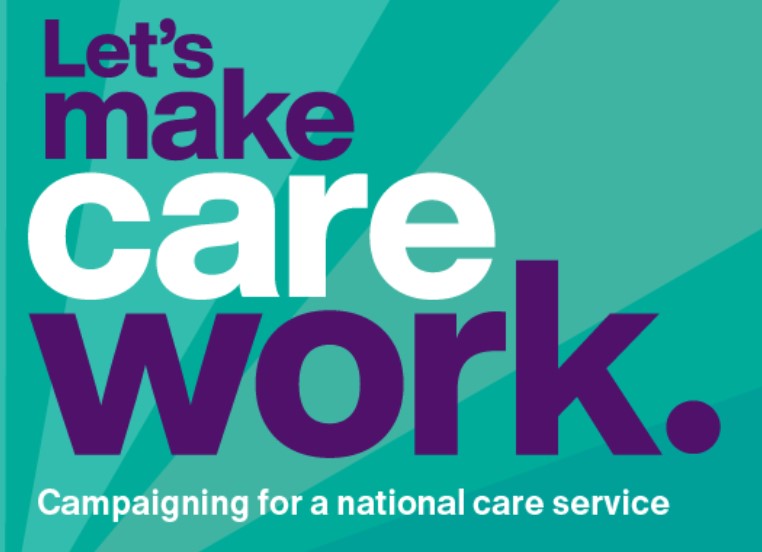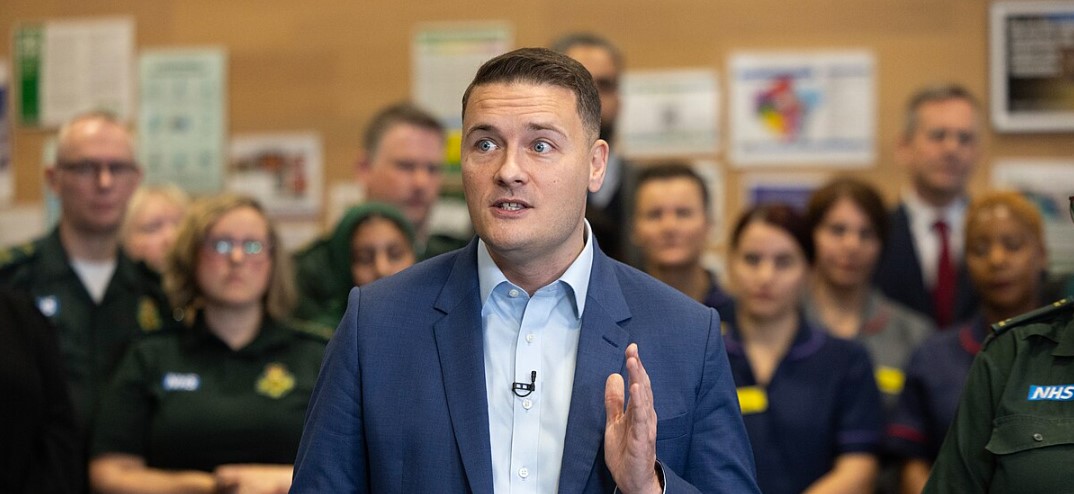By an NHS shop steward
Labour promised to “fix the NHS”, but since their election victory we have seen what can only be described as inaction, punctuated by symbolic announcements in various Tory tabloids, combined with a lot of ‘strategies’ and ‘reviews’.
On the July 11, just a week after the election, new Health Minister, Wes Streeting was to be found in The Sun promising “an inquiry into NHS performance”, on September 25 there was another NHS-bashing pledge, to send in ‘hit squads’ to under-performing hospitals. On December 7 there was a promise of mass expansion of GP training places (which will take five years to deliver anything), and in a nod to the populists he banned puberty-blockers for young people on December 11.
On December 19 there was a genuine crowd-pleaser in £100 mn for hospices, and on January 20 the headlines told us that the ‘Forty New Hospitals’ promised by Boris would be delivered. But on close inspection only the hospitals affected by the RAAC concrete scandal would get funding (between 2025 and 2030), while the others were postponed to 2035 or even 2039. In other words, it will never happen. So, we’ve had a series of announcements driven by either spin and politics, or else, in the case of RAAC or the hospices, the bare minimum required.
Meanwhile, Streeting has studiously looked away from the real problem – adult social care – and on January 3 he infamously announced an ‘independent review’ by Baroness Louise Casey into the issue…and that is not even going to start till sometime this year, and will probably report until just before the next scheduled election in 2028 or 2029.
Problems continue to mount up
Yet the problems continue to mount up. On any one day around a seventh of precious hospital beds are occupied by people who do not need medical care. They are there are purely because they have no suitable place to which they can be discharged.
Whatever Louise Casey finds can surely not be much different to the previous independent review, the Dilnot Report of fourteen years ago. In fact, since 1997, there have been two Commissions, two Green papers, two White papers, and innumerable reviews and reports. One thing the NHS does not need is another report.

In 1997, Tony Blair’s government set up the Royal Commission on Long Term Care. It reported in 1999 (the Sutherland Report), but in 2000 Blair rejected its main proposal to make personal care free. In 2002, Sir Derek Wanless was asked to conduct an independent review into NHS funding. He recommended a complete review of social care funding, which was rejected by the Treasury – who had commissioned his report in the first place!
In 2005 there was a Green Paper, Independence, Wellbeing and Choice, which said that major changes were needed in the next 10-15 years. In 2006 Sir Derek Wanless published Securing Good Care for Older People, which recommended shared funding of care between individuals and the state.
Everyone knows what needs to be done
Later in 2006 a White Paper, Our Health, Our Care, Our Future, made proposals – but no funding was given. In 2009 another Green Paper, Shaping the Future of Care, was published as part of a “Big Care Debate”, only to be followed by yet another White Paper called Building the National Care Service.
Then when the Tories-LibDem coalition government took office in 2010, they established yet another Commission, the Dilnot Commission, which reported in July 2011. But very few of its ideas secured funding or implementation.
Everyone knows what need to be done: improve training and qualifications for workers in the care sector; give them the Fair Pay Agreement set out in Labour’s Plan to Make Work Pay; give councils enough money to fund the care of old people both at home and residential settings; pay the army of unpaid carers something for what they do, cap the private contribution to care costs, and sort out some sort of insurance for the cost of nursing home care. These are the minimum steps required; socialists would call for a funded National Care Service, free at the point of use, working alongside the NHS.
But that would take funding; which Rachel Reeves and Keir Starmer have made impossible with their fiscal rules. And Wes Streeting is no Nye Bevan, to knock down all obstacles and build something worthwhile.
That leaves hospital trusts and staff muddling through crisis after crisis with ad–hoc measures like ‘corridor care’, using agency labour and overtime, at least until the accountants say “No more!”; and building up the use of ‘virtual wards’ – but all without any additional funding. The NHS is being asked to pull itself up by its own bootstraps.
Alan Milburn, ex-Blairite minister turned millionaire consultant and businessman, has refloated two of his failed ideas of the 1990s: league tables for hospitals, and ‘choose and book’ for appointments.
Performance in hospitals is mainly down to funding and catchment. Most ill-health is caused by old age, bad diets, smoking, slum housing and poverty. Hospital care just tries to pick up the pieces. League tables, and “Rewarding high performance” just pushes the good hospitals higher, while the ‘stick’ applied to the ‘poor performers’, like withholding pay rises from managers, pushes them further into crisis. Everyone games the system by picking the ‘quick win cases’ while pushing the difficult patients to Anywhere Else. It’s a soundbite, not a strategy.
Proper investment in social care
On Choose and Book, most patients just want to be seen; they are not picking a holiday. It was a fiasco under Milburn in 2003 and it will be a fiasco again. It needs a level of seamless software and management that is simply not available, and even if it was, there are many worthwhile things to spend the money on.
What would really improve NHS performance would be proper investment in social care at home, to prevent elderly patients coming into hospital in the first place, and to allow better discharge to a social care system worthy of the name.
But instead, at his cringy ‘relaunch’ in early December, Keir Starmer dug in on the attack on the NHS. “Productivity in the NHS is lower than before Covid”. That is rubbish. Before Covid NHS productivity increased faster than the wider economy every year. Then there was the huge shock of Covid, following which hospital activity has grown faster than the workforce.
People are knocking themselves out to get the waiting lists down, to see people in the A&E departments and give compassionate care on busy wards, but they are constantly stymied by the fact that there are insufficient beds, and of the beds which are there, one seventh are occupied by people who do not need to be in hospital.
Schemes that need funded implementation
Starmer also re-announced things the NHS has been doing for years: like booking appointments on a smartphone – which is a great idea and has been in place since 2015 – but is only used by 10% of patients. It needs funded implementation. Or the community diagnostic centres – the NHS began putting them in place long before Starmer won the election, taking the number from 89 to 170. Again, they just need funded implementation.
The other thing Starmer and Streeting keep returning to is “partnership with the private sector”. But the private sector only has 8,000 beds, mainly in the south-east. And they pick up the easy and profitable cases, not the diabetics or those with complex co-morbidities. And even then, there are over 6,000 emergency transfers every year from the private sector to the NHS when surgery or treatment goes wrong. The NHS is picking up the pieces again.

What Wes Streeting is not understanding is that merely applying fixes to one element or another of a complex and inter-connected system like the NHS, without addressing the fundamentals, will not work. In fact, it could make things worse.
If he puts special money into the ambulance services, together with edicts to Trusts to reduce ambulance handover delays, he will overload already busy A&E departments. Give a one-off boost just to A&E funding, and hospital beds will fill up faster than patients can be discharged. Build in more bed capacity, and more patients will come through for discharge – to bankrupt councils or a care sector in crisis.
The over 65s are the biggest users of A&E and of hospital care. It’s hardly surprising. Residents of care homes alone account for 200,000 visits to A&E every year, leading to around 1.5mn bed days in the NHS. And it is well known that elderly people admitted to hospital can rapidly become more dependent, and less fit for discharge home.
There some bright spots, where some of those terrible people, the NHS and council managers, have somehow carved a bit of resource out of their stretched budgets to try and make a difference. One example is in Barrow-in-Furness, where a joint project between the NHS and the local authority has created a free care facility for those who do not need hospital care but cannot be discharged straight home. It is only 18 beds but makes a massive difference.
There is a similar set-up in North Cumbria, working with the Carlisle and Workington Hospitals. The schemes are very similar to what we used to call ‘cottage hospitals’ – nurse-led units that provided care but not treatment, at a fraction of the cost of a place in a modern hospital. The HSJ estimates that every £100 spent in community care saves £130 in hospitals. It frees up the system.
The Chair of the Royal College of GPs, Clare Gerada, pointed out that modern cottage hospitals were a big part of the answer to an aging population. “The NHS was designed for a time when the average life expectancy was 67…the problem with the NHS at the moment…isn’t really that we are getting older; it’s actually because we are getting older with chronic disease…Clearly what we need now is a rethink, not a top-down reorganisation, but a rethink about where the staff are, where the resources are…how we develop what I would call cottage hospitals – we used to have them and they all got closed down”. (Evening Standard January 16, 2023)
And she could have added – and all sold-off, so private developers could make a killing.
All the data is screaming that the problems of the NHS can only be solved by a proper social care service. But Wes Streeting has just well and truly kicked that can down the road.
[Feature photograph of Wes Streeting from Wikimedia Commons, here]



